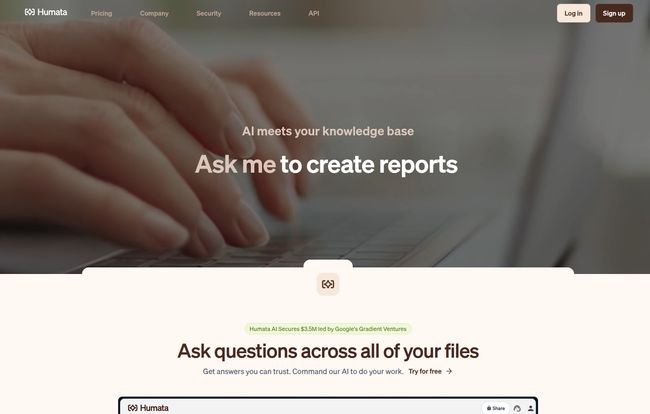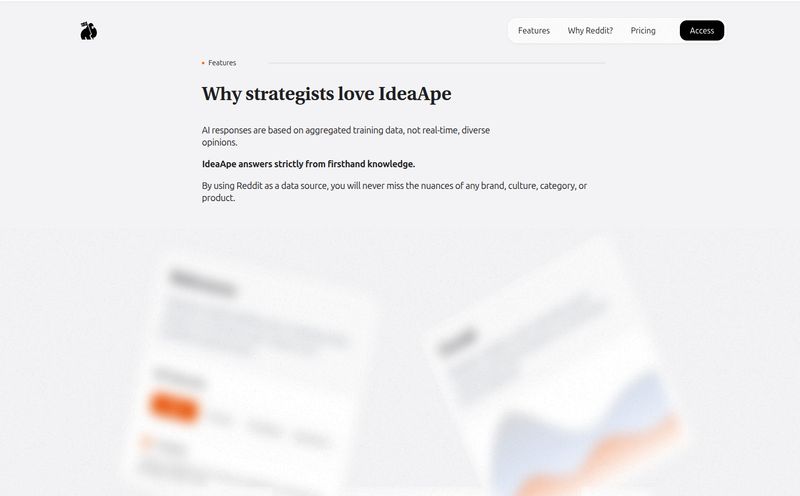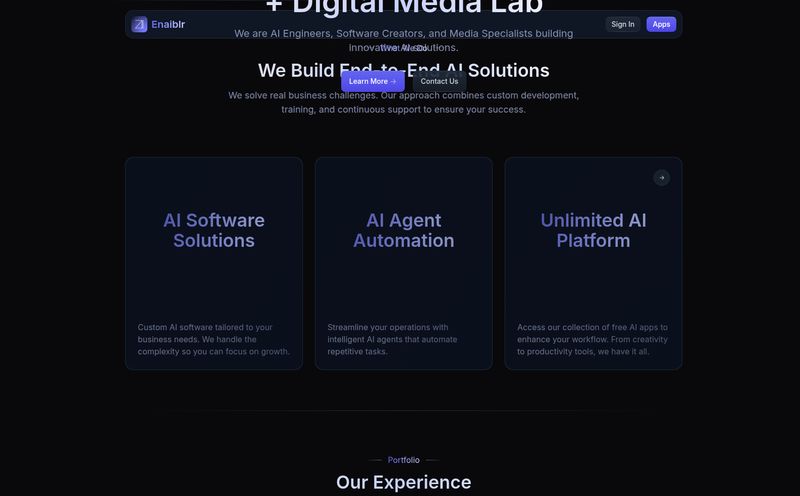If you're in any field that requires research—SEO, law, academia, you name it—your digital life is probably a chaotic graveyard of PDF files. You know the drill. You've got 15 browser tabs open, a desktop littered with files named 'Final_Report_v2_final_FINAL.pdf', and the creeping dread that the one tiny data point you need is buried on page 73 of a 150-page technical document. It's a nightmare. I've been there more times than I can count.
For years, the process has been the same: a pot of strong coffee, the CTRL+F shortcut, and a whole lot of tired-eye scrolling. But lately, a new breed of AI tools has been popping up, promising to be the searchlight in our data blizzard. One that's been making waves is Humata AI. The pitch is simple: stop reading, start asking. But as a professional blogger who's seen a million 'game-changing' tools, I'm naturally skeptical. So, I took it for a spin. And I've got some thoughts.
So, What Exactly is Humata AI?
Forget the corporate jargon for a second. At its heart, Humata AI is like hiring a super-fast, incredibly focused research assistant who's an expert on exactly one thing: the documents you give them. You upload your files—be it dense legal contracts, scientific papers, or your competitor's latest annual report—and you can just... talk to them. Ask questions in plain English. “What were the Q3 revenue findings?” or “Summarize the main arguments against this patent” or even “Compare the marketing strategies in these two documents.”
Instead of you hunting for the information, Humata’s AI goes digging for you, presenting the answers in a neat, summarized format. The idea is to cut down research time from hours to minutes. A bold claim, but one I was very eager to test.
My First Run-In With Humata and the 'Aha!' Moment
To really put it through its paces, I uploaded a notoriously dense PDF: a recent whitepaper on Google's approach to AI in search rankings. It was a beast. The kind of document you'd normally print out just to feel like you're making progress. Instead of spending my afternoon deciphering it, I just started asking questions.
“What are the three main takeaways from this paper?”
Boom. A concise, bulleted summary appeared in seconds. But here's the part that really got me.

Visit Humata AI
Next to each point in the answer was a small citation, linking directly to the exact spot in the original PDF where it found the information. I clicked it, and the document viewer scrolled right to the highlighted paragraph. That was my 'aha!' moment. This wasn’t just a black-box AI making stuff up; it was a transparent tool showing its work. For anyone who needs to verify their sources (which should be everyone, frankly), this feature alone is worth its weight in gold.
The Features That Actually Matter
A lot of SaaS platforms are bloated with features you'll never touch. Humata keeps it refreshingly focused. Here’s what stood out to me.
A Conversation with Your Documents
The core of Humata is its chat interface. It feels less like using a piece of software and more like briefing a colleague. You can ask follow-up questions, ask it to rephrase something, or tell it to dig deeper into a specific point. It turns a static, one-way document into a two-way dialogue. It’s surprisingly intuitive and lowers the barrier to entry for tackling complex materials.
Citations: The Antidote to AI Hallucinations
I can't stress this enough. We've all seen the headlines about AI models confidently making things up—what the nerds call 'hallucinations.' In a professional setting, that's a liability. Humata's direct citations are the perfect cure. It builds a layer of trust that's missing from so many other generative AI tools. You never have to blindly trust the summary; you can check the source with a single click. That's teh real magic right there.
Finally, Secure AI Collaboration for Teams
While I often work solo, I immediately saw the potential for my agency days. The higher-tier plans offer secure “data rooms” where a team can upload a project's worth of documents. Everyone can query the same knowledge base, ensuring the whole team is working from the same information. With role-based permissions and enterprise-grade encryption, it addresses the security concerns that make many companies hesitant to adopt AI for sensitive data. No more emailing different versions of a report back and forth. Thank goodness.
The All-Important Question: What Does Humata Cost?
Alright, let's talk about the price tag. Humata uses a tiered model, which I appreciate because it lets you choose your own adventure. It's not a one-size-fits-all situation. Here's a quick, no-nonsense breakdown:
| Plan | Price | Best For | Key Features |
|---|---|---|---|
| Free | $0/month | Casual users or just trying it out. | Up to 60 pages, 10 questions. A test drive. |
| Student | $1.99/month | Students or academic researchers on a budget. | 200 free pages/month, basic support. |
| Expert | $9.99/month | Freelancers, professionals, and small teams. | Uses GPT-4.0, 500 pages, 3 users. (This is the sweet spot, in my opinion). |
| Team | $49/user/month | Established teams and businesses. | 5,000 pages, 10 users, OCR, personalization, folder permissions. |
In my experience, the free plan is a demo. It’s enough to give you that 'aha!' moment I described, but you'll hit the limits quickly. The Expert plan at $9.99 feels like the absolute best value. You get the more powerful GPT-4 model and a generous page count for the price of a couple of fancy coffees. For serious business use, the Team plan unlocks the powerful collaboration and security features that larger organizations need.
The Honest Breakdown: Pros and Cons
No tool is perfect. After spending some quality time with Humata, here's my balanced take.
What I Really Liked
The speed is genuinely impressive. It chews through documents faster than I can brew a cup of tea. The cited sources, as I've mentioned, are a massive point of trust and utility. The interface is clean and simple, avoiding the feature bloat that plagues so many other platforms. It does one thing, and it does it exceptionally well. Plus, the flexible pricing means you're not forced into an expensive plan you don't need.
A Few Caveats to Consider
The biggest thing to watch is the pricing model. While flexible, it is usage-based. Once you go over your plan's included pages, you start paying per page. For teams dealing with massive volumes of documents, this could add up. Also, some of the most advanced features, like OCR for scanned documents and response personalization, are reserved for the higher-priced Team plan. This makes sense from a business perspective, but it's a limitation for solo power users who might want those features without the full team price tag.
My Final Verdict: Is Humata AI a Game-Changer?
So, is Humata AI worth it? For me, the answer is a resounding yes. It’s not just another novelty AI toy; it’s a practical tool that solves a real, frustrating problem. It bridges the gap between our massive piles of data and the specific answers we need to find within them.
"Humata has helped transform our research business model. We love the simplicity of Humata and the major efficiency boost it provides. We can’t imagine working without it." - Phil Fersht, CEO and Chief Analyst, HFS Research
If you're a student drowning in research papers, a legal professional wading through discovery documents, or a marketer trying to extract insights from competitor reports, you owe it to yourself to try it. Start with the free plan. Upload a document that's been giving you a headache. I have a feeling you'll have your own 'aha!' moment pretty quickly.
It's one of the few tools I've tested recently that I've actually incorporated into my own workflow. And in the fast-moving world of SEO and digital marketing, any tool that gives me back time is a winner in my book.
Your Humata AI Questions Answered
- What makes Humata different from just using ChatGPT?
- The key differences are focus and trust. Humata is specifically designed to work with your files. Its biggest advantage is providing citations that link directly back to the source text in your document, which helps prevent AI 'hallucinations' and allows for easy fact-checking.
- Is Humata AI safe for sensitive documents?
- Humata emphasizes security. They use enterprise-grade encryption for files at rest and in transit. Their team plans also offer advanced security features like role-based permissions and secure data rooms, making it suitable for confidential business or legal documents.
- Can I really use Humata for free?
- Yes, there is a free plan. It's great for testing the platform's core functionality but is quite limited (60 pages and 10 questions per month). Think of it as a free trial to see if you like the workflow before committing to a paid plan.
- How does the per-page pricing work?
- Each paid plan includes a certain number of free pages per month (e.g., the Expert plan includes 500). If you upload more pages than your monthly allowance, you're charged a small fee for each additional page (e.g., $0.02 per page on the Expert plan). This allows the pricing to scale with your usage.
- Is it hard to integrate Humata onto a website?
- No, one of Humata's features is an embeddable AI widget. This allows you to add a chat interface to your own website, enabling visitors to ask questions about your public documents (like help guides, FAQs, or reports). This is a more advanced feature typically found in higher-tier plans.
Reference and Sources
- Humata AI Official Website
- Humata AI Pricing Page
- What is an AI Hallucination? (ZDNet) - For context on why citations are so important.



